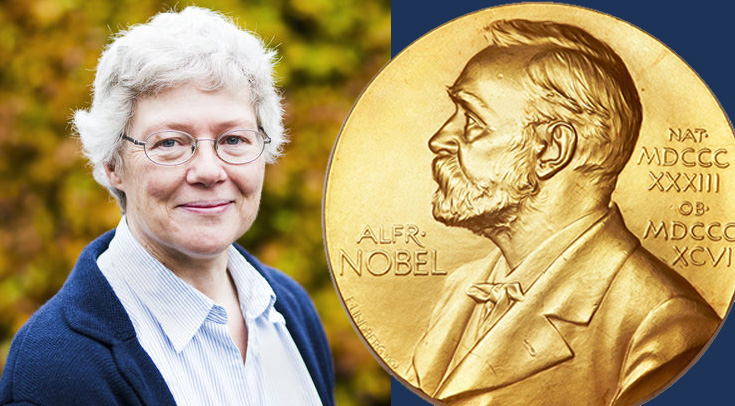
Professor Anne L’Huillier, atomic physics at LTH, has been awarded the Nobel Prize in Physics in 2023, jointly with Pierre Agostini and Ferenc Krausz for their experiments, which have given humanity new tools for exploring the world of electrons inside atoms and molecules.
When Anne L’Huillier was recently awarded Lund University's gold medal, Lund University's vice-chancellor Erik Renström, said:
– Anne L’Huillier is a physicist and Lund University's most decorated researcher. She has received the Wolf Prize in physics – often referred to as the "little Nobel Prize" in physics – and now, only the Nobel Prize itself remains for her.
Now, not even the Nobel Prize remains!
Anne L’Huillier was in the middle of a lecture when the Royal Swedish Academy of Sciences contacted her during a scheduled break and informed her that she had been awarded the Nobel Prize. After getting the news, L'Huillier went right back to her students and told them that the lecture would end a little earlier today ... With only minutes left until the Nobel Prize was to be announced, the students understood what was happening, and it is not an exaggeration to say that the lecture truly became historic.
– We are incredibly proud and happy that Anne L’Huillier has been awarded the Nobel Prize. In addition to being a world-leading researcher, she is a humble person and important role model for young researchers and all LTH students. I hope that our researchers and students will be energised by the fact that a highly talented LTH Professor got the Nobel Prize in Physics 2023. This is truly a day for celebrating! says Annika Olsson, Dean of the Faculty of Engineering, LTH.
Extremely short pulses of light
The three Nobel Laureates Pierre Agostini, Ferenc Krausz and Anne L’Huillier have demonstrated a way to create extremely short pulses of light that can be used to measure the rapid processes in which electrons move or change energy.
Fast-moving events flow into each other when perceived by humans, just like a film that consists of still images is perceived as continual movement. If we want to investigate really brief events, we need special technology. In the world of electrons, changes occur in a few tenths of an attosecond – an attosecond is so short that there are as many in one second as there have been seconds since the birth of the universe.
A "first" experiment
In 1987, Anne L’Huillier discovered that many different overtones of light arose when she transmitted infrared laser light through a noble gas. Each overtone is a light wave with a given number of cycles for each cycle in the laser light. They are caused by the laser light interacting with atoms in the gas; it gives some electrons extra energy that is then emitted as light. In a series of works, Anne L’Huillier continued to explore this effect during the 1990s, including at LTH in her new home university in Lund. The results contributed to the theoretical understanding of the phenomenon and paved the way for the next experimental breakthrough.
In 2001, Pierre Agostini succeeded in producing and investigating a series of consecutive light pulses, in which each pulse lasted just 250 attoseconds. At the same time, Ferenc Krausz was working with another type of experiment, one that made it possible to isolate a single light pulse that lasted 650 attoseconds.
The laureates’ contributions have enabled the investigation of processes that are so rapid they were previously impossible to follow.
“We can now open the door to the world of electrons. Attosecond physics gives us the opportunity to understand mechanisms that are governed by electrons. The next step will be utilising them,” says Eva Olsson, Chair of the Nobel Committee for Physics.
....
Continue Reading
